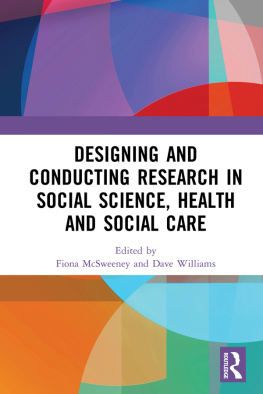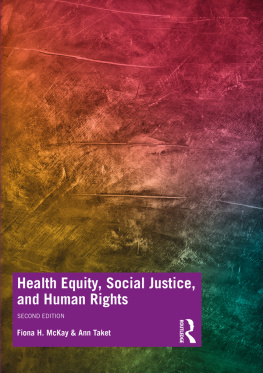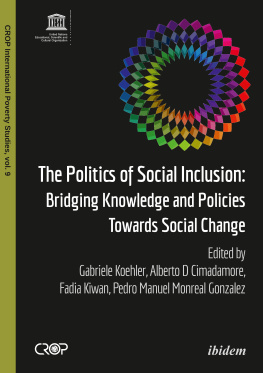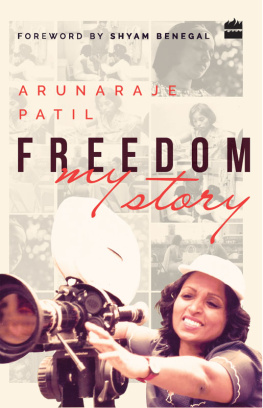TRANSPORT, DEMAND MANAGEMENT AND SOCIAL INCLUSION
For Maureen and Dilip, for everything
Transport, Demand Management and Social Inclusion
The Need for Ethnic Perspectives
FIONA RAJ,
Transport Studies Unit,
University of Oxford
with assistance from
MARGARET GRIECO
Napier University and Cornell University
JULIAN HINE
University of Ulster
JOHN PRESTON
University of Oxford
First published 2004 by Ashgate Publishing
Published 2016 by Routledge
2 Park Square, Milton Park, Abingdon, Oxon OX14 4RN
711 Third Avenue, New York, NY 10017, USA
Routledge is an imprint of the Taylor & Francis Group, an informa business
Copyright 2004 Fiona Raj
Fiona Raj has asserted her right under the Copyright, Designs and Patents Act, 1988, to be identified as the author of this work.
All rights reserved. No part of this book may be reprinted or reproduced or utilised in any form or by any electronic, mechanical, or other means, now known or hereafter invented, including photocopying and recording, or in any information storage or retrieval system, without permission in writing from the publishers.
Notice:
Product or corporate names may be trademarks or registered trademarks, and are used only for identification and explanation without intent to infringe.
British Library Cataloguing in Publication Data
Transport, demand management and social inclusion : the need for ethnic perspectives. - (Transport and society)
1. Transportation - Social aspects - Great Britain 2. Transportation - Social aspects - Great Britain - Case studies 3. Transportation and state - Great Britain 4. Transportation and state - Great Britain - Case studies 5. Minorities - Great Britain - Economic conditions 6. Minorities - Great Britain - Economic conditions - Case studies 7. Minorities - Great Britain - Social conditions 8. Minorities - Great Britain - Social conditions - Case studies 9. Marginality, Social - Great Britain 10. Great Britain - Ethnic relations - Economic aspects
I. Raj, Fiona
388'.0941
Library of Congress Cataloging-in-Publication Data
Transport, demand management and social inclusion : the need for ethnic perspectives / Fiona Raj.
p. cm. -- (Transport and society)
Includes bibliographical references and index.
ISBN 0-7546-4045-0
1. Transportation--Social aspects--Great Britain. 2. Marginality, Social--Great Britain. 3. Transportation and state--Great Britain. I. Raj, Fiona, 1966- II. Series.
HE243.T6845 2004
303.48'32'0941--dc22
2004046331
ISBN 9780754640455 (hbk)
ISBN 9781138254855 (pbk)
Contents
I cant get the bus, only like one or two, with the pram. Like usually if I go to my friends house, there is a bus and she lives quite far. But you can wait up to an hour for that bus and you cant get on it with a pram. So I have to go all the way up to town and then get on a bus which has space at the front of the bus for a pram and you can sit by your pram and the bus lowers.
(Black Caribbean Single Mother, 19 years old, Easton, Bristol)
I live in Montpelier, my daughter lives in Easton and I cant catch a bus to Easton. I have to go into town which is the complete other direction and then I have to catch a bus to Easton but it wont even go anywhere near where she lives. I have to get off at bottom of Stapleton Road and its very expensive to have to catch 2 buses just to go a mile and a half to visit my daughter. And Ive got another situation when my daughter was in labour and we had to go to St Michaels Hospital which is on the hill in Kingsdown and is one of the steepest hills in Bristol and its quite a way and theres no bus service. So we had to walk with her in labour because we couldnt afford a taxi. The nearest bus is at the top of the hill, the 8 and you have to walk down. She was up 3 times that weekend and we could only afford the taxi once. It was really serious. They closed the ward and wouldnt let her stay even though she was in the beginning stages of labour and we had to go home with the worry that we couldnt afford any more taxis to get back there again. It was a nightmare.
(White Mother of Black Caribbean Single Mother, 40 years old, Montpelier, Bristol)
You find that in many UK cities the wards near the city centre were neglected for many years but now everyone wants to work, live near by and have leisure there too. So there is a push factor, the old communities get run down, land prices depreciate and a developer comes along and pushes up housing prices. Then people have to live further away and commute by car and have a problem with parking in the city centre and cause great congestion. I think successive governments have not really dealt with the issue of transport in the UK. John Prescott and his merrymen should have gone to Europe for 2 weeks and see what Germany, Holland, France, Sweden do and then make strategic decisions.
(Asian man, Outreach Worker, 35 years old, Easton, Bristol)
On my way to school, theres often too many rough people on the buses.
(Asian schoolboy, 14 years old, Easton, Bristol)
(In answer to the question: What journeys would you like to make by public transport and cannot?) Go to college. South Nottingham College is in West Bridgford which is like the next place to here. And its a Trent Bridge bus. Not only that getting to Trent Bridge, youd have to get a bus down to the bottom of the estate, get the Trent Bridge bus there, get to Trent Bridge cross over the road and get another one. Thats 3 buses to go 10 minutes in the car. I was actually a volunteer helping with English classes for people who speak other languages and I had to give it up because it was 4 hrs a day to get there for a 2 hr lesson. It was ludicrous.
(White woman attending a young mothers group, Clifton, Nottingham)
These voices on transport and social exclusion in Britain are rarely heard directly: transport inconvenience, transport fear and simply the lack of transport are the common experience of much of low income Britain. Typically these voices are mediated through the looking glass of transport experts and policy gurus. The lived experience of public transport in modern Britain requires a more thorough recording. The objective of this book is to bring together the expression of these voices with an understanding of current changes in the transport policy arena and traffic management environments. The book begins with an overview of the current understanding of transports relationship to social inclusion/exclusion.
The interaction between social inclusion/exclusion and transport has not been adequately charted in Britain to date. However, the focus on the part poor transport links play in social deprivation and exclusion is rapidly strengthening as discussion of neighbourhood renewal and regeneration have become part of the policy agenda: one summary of the state of the field is provided by renewal.net:1
Poor transport links within deprived neighbourhoods, and between deprived neighbourhoods and the wider community, mean:
Individuals:
can be cut off from jobs, education and training;
may be unable to access cheap, fresh food;
may only access health care in a crisis;














